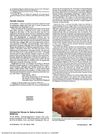 July 2004 in “Dermatologic Surgery”
July 2004 in “Dermatologic Surgery” A woman had temporary hair loss due to a stress-related condition after a facelift.
 16 citations,
February 2001 in “PubMed”
16 citations,
February 2001 in “PubMed” Allergic scalp reactions can cause temporary hair loss.
 11 citations,
January 2018 in “Annals of Dermatology”
11 citations,
January 2018 in “Annals of Dermatology” Some people experienced temporary hair loss after hair transplant surgery but recovered fully within 10 months.
May 2021 in “Indian journal of forensic medicine and toxicology” Low levels of iron and vitamin D might be linked to chronic hair loss in women.
 December 2023 in “Journal of family medicine and primary care”
December 2023 in “Journal of family medicine and primary care” Many people in Saudi Arabia experienced hair loss after COVID-19, especially women, those treated with antivirals, and those with a history of hair shedding.

COVID-19 infection is highly related to increased hair loss, especially in women.
 4 citations,
March 2021 in “International Journal of Dermatology”
4 citations,
March 2021 in “International Journal of Dermatology” COVID-19 and related stress may increase hair loss known as Telogen effluvium.
 3 citations,
April 2022 in “Clinical, Cosmetic and Investigational Dermatology”
3 citations,
April 2022 in “Clinical, Cosmetic and Investigational Dermatology” Different methods, including stress management, healthy diet, supplements, and treatments like minoxidil, can help hair grow back after COVID-19 related hair loss.
 45 citations,
March 2010 in “Journal der Deutschen Dermatologischen Gesellschaft”
45 citations,
March 2010 in “Journal der Deutschen Dermatologischen Gesellschaft” A systematic approach is crucial for managing hair loss in women.
 6 citations,
October 2012 in “BMJ”
6 citations,
October 2012 in “BMJ” The woman's hair loss was mainly due to stress and low iron levels, and her hair grew back after treatment.
 6 citations,
March 1990 in “Archives of Dermatology”
6 citations,
March 1990 in “Archives of Dermatology” Sam Shuster identified three types of hair loss in psoriasis and emphasized the need for better research to understand them.
 March 2024 in “International journal of research in medical sciences”
March 2024 in “International journal of research in medical sciences” Dr. SKS hair booster serum effectively treats hair loss caused by COVID-19.
 18 citations,
March 2016 in “Cosmetics”
18 citations,
March 2016 in “Cosmetics” Telogen Effluvium is a condition causing excessive hair loss due to stress, illness, drugs, or hormonal changes, and can be treated with specific products or naturally resolves after 3-4 years.
 28 citations,
January 2021 in “Skin appendage disorders”
28 citations,
January 2021 in “Skin appendage disorders” COVID-19 may cause early hair loss similar to classic temporary hair loss, with further research needed.
 234 citations,
December 1996 in “Journal of The American Academy of Dermatology”
234 citations,
December 1996 in “Journal of The American Academy of Dermatology” Middle-aged women with chronic telogen effluvium experience increased hair shedding but usually don't get significantly thinner hair.
 40 citations,
May 2020 in “Cureus”
40 citations,
May 2020 in “Cureus” The conclusion is that treatments for Telogen Effluvium exist, but standard treatment guidelines are needed.
 8 citations,
June 2012 in “Australasian Journal of Dermatology”
8 citations,
June 2012 in “Australasian Journal of Dermatology” A rare form of alopecia causes hair thinning without bald spots and may be more common than thought, responding well to steroid treatment.
 April 2023 in “Journal of Investigative Dermatology”
April 2023 in “Journal of Investigative Dermatology” Cinchona succirubra extract with caffeine improves hair growth and reduces hair loss.
 August 2024 in “International Journal of Medicine”
August 2024 in “International Journal of Medicine” COVID-19 can cause hair loss, and managing it involves counseling, diet changes, and treatments.
 September 2024 in “Journal of Bioscience and Applied Research/Journal of Bioscience and Applied Research ”
September 2024 in “Journal of Bioscience and Applied Research/Journal of Bioscience and Applied Research ” COVID-19 can cause hair loss due to stress, with inflammation markers like D-dimer levels playing a role.

COVID-19 can cause significant hair loss.
 4 citations,
November 2009 in “Medical Clinics of North America”
4 citations,
November 2009 in “Medical Clinics of North America” Stress, nutritional issues, and chronic diseases can cause hair loss, and nail changes may signal internal diseases; treatment focuses on the underlying cause.
 May 2024 in “World Journal Of Advanced Research and Reviews”
May 2024 in “World Journal Of Advanced Research and Reviews” Low iron levels are strongly linked to chronic hair loss in women.
 1 citations,
April 2022 in “Revista Da Associacao Medica Brasileira”
1 citations,
April 2022 in “Revista Da Associacao Medica Brasileira” COVID-19 can cause different types of hair loss, and proper diagnosis by a specialist may be needed.
 July 2017 in “The American Journal of Cosmetic Surgery”
July 2017 in “The American Journal of Cosmetic Surgery” A patient's hair loss after a browlift surgery improved on its own over 8 months.
 2 citations,
January 2012 in “Journal of Cutaneous Pathology”
2 citations,
January 2012 in “Journal of Cutaneous Pathology” The author clarifies that alopecia areata incognito and diffuse alopecia areata are different types of hair loss with unique symptoms and challenges in diagnosis.
 May 2022 in “Acta Scientific Women's Health”
May 2022 in “Acta Scientific Women's Health” A woman lost over 80% of her hair due to a condition called telogen effluvium after having COVID-19.
 7 citations,
September 2021 in “Anais Brasileiros De Dermatologia”
7 citations,
September 2021 in “Anais Brasileiros De Dermatologia” COVID-19 can cause temporary hair loss, often starting around 7-8 weeks after recovery, with factors like Vitamin D deficiency, other diseases, medication, and stress potentially contributing.
 December 2021 in “Trichology and cosmetology:”
December 2021 in “Trichology and cosmetology:” Taking Kera-Diet® improves hair and nail health without side effects.
3 citations,
August 2022 in “International Journal of Molecular Sciences” COVID-19 can cause hair loss, and treatments like PRP and stem cells might help.




























